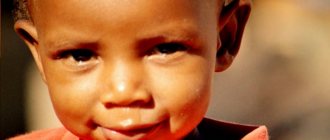Causes
There are two main reasons why a child does not want to speak at 2.5 years old. Both of them are not associated with illnesses, traumas and developmental delays, which is why they can be solved without problems:
- “Silence” in communication with a child. Speech therapists, psychologists and experienced teachers recommend talking to a newborn from its first days. The child must hear speech from the very beginning in order to have an interest in it, and so that later it will be easier for him to teach him to speak.
- If the speech of the adults around the child is fluent, fast, and unclear, then the children are not able to repeat all this. This creates a problem that can be solved simply by slowing down the pace of speech. And not only in communication with the baby, but also always when he is in close proximity.
Common physiological causes are:
- hearing problems;
- motor apraxia of the facial or tongue muscles;
- unfavorable conditions during intrauterine development, difficult childbirth;
- severe colds and viral diseases in the first 2 years of life;
- traumatic brain injuries, including minor ones;
- stress from moving, changes in family composition;
- bilingual family or environment;
- increased intracranial pressure;
- birth injury;
- no need for speech.
Reasons include physiological factors (genetic predisposition, underdevelopment of the speech apparatus), psychological (lack of attention, fear), neurological diseases (motor alalia - the child does not speak at all or speaks poorly, confusing endings, sensory alalia - speech underdevelopment, characterized by impaired speech understanding , dysarthria - erratic breathing rhythm, nasal voice, unclear pronunciation of sounds, aphasia - the child’s speech is distorted, the pronunciation and meaning of phrases are impaired).
Symptoms of speech delay
Doctors call immaturity of the emotional-volitional sphere the most striking sign of speech delay in a child aged 2.5 years. It is quite difficult for a child with such a disease to force himself to do anything.
Symptoms of speech delay also manifest themselves in organic changes. When examined using electroencephalography or the evoked potential method, disturbances are detected in the left hemisphere - it is this hemisphere that is responsible for speech development.
Signs of delayed speech development in a child may include:
- abnormal course of the pre-speech period;
- the presence of a large number of errors in speech;
- lack of reaction to speech and sound in a one-year-old child;
- inactive attempts to repeat other people's words;
- the child does not want to communicate with adults;
- inability to perform a simple task by ear at 1.5-2.5 years of age;
- absence of independent words at the age of 2.5 years;
- lack of conversation at 3 years;
- the child cannot answer simple questions or show objects.
Norms of speech development at the age of 2.5 years
Although each child’s speech development follows an individual plan, there are common norms for speech development and average statistical periods for the appearance of certain language units. By the age of 2.5 years, children pronounce simple two-word phrases; the dictionary of children of this age contains from 50 to 250 words. These are mainly nouns and verbs, less often pronouns, adjectives, and adverbs.
By the time between the third and fourth years of life, the active vocabulary will increase to 1 thousand words.
Willingness to communicate with familiar and unfamiliar adults and children is the main quality of children's speech at this age. Although the child speaks in simple sentences, he can easily talk about what he saw and ask about what interests him.
Weakness of the muscles of the lips and tongue, the inability to perform subtle movements of the organs of articulation lead to the fact that the baby cannot yet pronounce many sounds accurately. Mastering sibilant and sonorant consonants (“l”, “r”) is still ahead.
This article will tell you how to teach your child the correct pronunciation of “r”.
A 2.5-year-old child is actively interested in his surroundings, often asks about objects and phenomena that are accessible to his understanding: “What is this?”, “Why?”, “Why?”. These questions cannot be ignored, because without receiving an answer several times, children simply stop turning to adults. If parents answer all the questions of interest to a little person who is exploring the world, they develop a very valuable quality - his inquisitive mind, the desire for knowledge, thereby developing the child as a whole.
Also at this age the child should:
- get rid of the use of distorted words and simplifications;
- distinguish relatives by names;
- know several dozen voices of animals and birds.
Stages and norms of speech development
Since speech is important not only for full communication, but also has an impact on the mental development of the child (associated with the development of memory, attention, thinking and imagination), it is worth paying close attention to delayed speech development.
Knowledge of the stages and norms of speech formation helps to identify such violations.
It is important to remember that the norm is a relative concept, and each child has individual capabilities and characteristics; the time of appearance of certain speech forms may vary in terms of timing.
Main stages of development:
- From birth to the 1st month
of life, the baby reacts to the intonation of speech addressed to him (shows joyful animation, cries). At this time, the first vocal reaction appears - the child screams, and by the second or third month the scream has a variety of intonations. - From the 2nd - 3rd month,
humming is observed - the toddler makes individual melodious sounds and listens carefully. These sounds are the same for children of any nationality - a-a-a, o-o-o, gu-u-u, mmm. By the 4th month, the combinations become more complex, and the baby gradually weeds out combinations of sounds that are unusual in his native language. - From 4 to 5 months,
babbling turns into babbling - the baby reproduces combinations of syllables, imitating the speech of others. After the 6th month, babbling sounds accumulate intensively and gradually turn into babbling words. Important: in case of delayed speech development, babbling appears at a later age, and if there are problems with hearing, the humming stops. - From 6 to 10 months
, “quantity turns into quality” - the baby repeatedly repeats the same babbling chains of sounds, babbling words also appear that are correlated with specific objects and persons (“bi-bi”, “av-av” etc.). Speech is distinguished by emotional expressiveness, there is a reaction to one’s name. The baby begins to correlate the sound image of the word with the object, responds to questions (shows the named object, looks in its direction). - From 10 months to a year,
sentence words appear (a word expresses a feeling, desire, or designates an object, depending on the situation). - From 1 to 3 years,
the pace of speech development in a child actively exploring the world accelerates. The child is interested in the names of new items and objects and actively uses new words. There are sound distortions, syllables are rearranged, and hard-to-pronounce sounds are missed. Often only the initial syllables are used.
It is important - normally, a child of the second year of life is able to easily pronounce the sounds o, n, t', d', t, d, k, g, x, v, f, and closer to the 3rd year also th, l', uh, s'.
Elementary phrasal speech is formed by the age of 2 - the baby is able to combine several simple words in the process of communication (give me a drink, etc.).
At one and a half years old, a child's vocabulary is approximately 100 words, at the age of two years - about 300, and by the end of early childhood - approximately 1500 words.
Correct use of grammatical categories begins in children after 2.5 years.
Deviations from the norm
Minor deviations from the deadlines while maintaining the stages of speech development usually indicate an individual peculiarity of the toddler. It should be remembered that girls usually begin to speak earlier than boys and like to imitate adults more. The stronger sex is more action-oriented; boys often use their first words to indicate actions, and sometimes they do not want to repeat after adults.
We recommend:
Daily questions for your baby
If a child does not speak at 2 years old, but differs little from his peers and perfectly understands what adults want from him, there is no need to worry too much. Sometimes active speech appears suddenly, and yesterday’s silent child, with due attention from adults, turns out to be a completely talkative child.
In case of concern, parents should determine the cause of the baby’s silence by excluding possible pathology. For this purpose, you need to contact a pediatrician, the doctor will give referrals to a speech therapist and other specialized children's specialists (ENT, neurologist, psychiatrist).
Which specialist should I contact?
If the child is constantly observed by a pediatrician, then problems with speech development will be diagnosed at an early stage, and the doctor himself will refer the child to specialists.
If there is no permanent pediatrician, or he does not share parental concerns, you should contact doctors of the following specializations:
- neurologist;
- otolaryngologist (ENT);
- psychologist;
- speech therapist-defectologist.
Only after consulting all these doctors can you accurately determine what is causing the delay in speech development in a child and how to deal with it.
Depending on the area in which the problem is identified, the type of treatment is determined. You should be prepared for the fact that most of these cases require drug treatment. Drugs prescribed by a neurologist or speech pathologist help activate the “speech” areas of the brain and provide the necessary nutrition to neurons.
Why doesn't a two-year-old child speak?
All children who do not speak at the age of two can be divided into two groups:
- Absolutely healthy babies who “remain silent” due to temperament and other individual developmental characteristics.
- Children with various pathologies that impede normal speech development.
Often, in the absence of health problems, a 2-year-old child does not speak in the following situations:
- Speech is not needed.
This situation occurs both in children left to their own devices and in children suffering from overprotection. The little ones remain silent for a long time, for various reasons they do not receive full communication with their parents - they have neither an example to follow nor an incentive to develop speech. Adults who are excessively fussing over the child, practically guessing the child’s wishes and immediately rushing to fulfill them, stimulate prolonged silence (usually such children have a limited set of words that allow them to manipulate others). Children who are overprotected have no need to voice their desires and feelings; they get by just fine with gestures. - There are stressful situations and fear.
Healthy children who are in an emotionally dysfunctional environment become withdrawn and silent due to strong stressful experiences (primarily, regular family scandals have a stressful effect on the child). A child at this age can be negatively affected by moving, a serious illness requiring hospital treatment, improper adaptation to kindergarten, etc. Children of this age perceive separation from their mother especially acutely. - There is bilingualism in the family.
Although children learn a variety of languages much more easily than adults, regularly using different names for the same objects makes it difficult for a child to accurately determine which names to use. - The child has a negative attitude towards speech.
Usually, children with a stubborn, independent character are stubbornly silent and do not respond to requests to say or repeat anything. And the more the parents insist, the more withdrawn and silent the child becomes. - The child has unlimited access to a TV, computer, etc.
- in this case, he often perceives speech as background noise, without distinguishing the parental voices from the stream of sounds.
Pathologies causing delayed speech development
In addition to the above socio-psychological factors, there are also medical reasons. Such reasons include:
- Hearing impairment.
Hearing is the leading speech analyzer, and various problems with it lead to speech disorders in children. A child who has been deaf since birth is unable to master speech on his own. In children with hearing loss, due to the inferiority of speech perception, its understanding and reproduction suffers. - Limited mobility of the speech organs
, which occurs in case of damage to the nervous system (dysarthria) in children. Appears due to injuries, cerebrovascular accidents, neuroinfections, etc. It is often one of the manifestations of cerebral palsy. Depending on the severity of the pathology, children's speech is characterized by minor articulation disorders or is practically absent. - Congenital anomalies
of the development of the maxillofacial region, complicating the development of speech in children. - Hereditary diseases
(familial bradyllia, myasthenia gravis, Down syndrome, etc.). - Pathologies of the brain and nervous system.
With organic lesions of the cortical speech centers located in the brain (can be intrauterine or occur during the first years of life), alalia develops; in this case, the baby’s speech reactions appear late, the vocabulary is poor, the syllable structure and sound pronunciation are impaired. Local organic brain damage leads to the development of aphasia in children; in this case, previously acquired speech skills are lost.
A fairly common reason that explains a child’s silence in the absence of physical pathologies is autism. This is a disorder of the development of the nervous system, expressed in isolation, weak expression of emotions and active avoidance of the outside world. A slight delay in speech development is also observed in the case of autism-like Asperger's syndrome.
Predisposing factors to the fact that the baby does not speak by the end of 2 years of life are:
- long-term toxicosis, maternal illnesses during pregnancy;
- too long/quick labor;
- fetal hypoxia;
- birth injuries in children;
- taking contraindicated medications by the mother during pregnancy.
Helping your child develop speech skills
When the cause of a child’s prolonged silence is any pathology, the development of speech should be accompanied by treatment of the underlying disease. Drug/surgical therapy for children is prescribed by doctors of a narrow specialty - neurologist, psychiatrist, ENT specialist.
Activation of the activity of the child’s speech zones is facilitated by cortexin and other drugs, magnetic therapy, and, in the absence of contraindications, electroreflexotherapy.
Classes are held with a defectologist to help individually prevent the development of new deviations and correct existing ones.
Speech therapy massage is also recommended for children who speak poorly.
To develop speech skills, sick and completely healthy silent children need regular “conversational” classes with parents, including:
- Articulation gymnastics.
- A variety of activities that develop fine motor skills (sculpting, finger games, pouring and sorting small objects, etc.), they stimulate the speech center.
- Slow, expressive reading (rhythmic speech is easier for children to perceive, give preference to children's poems), stories based on pictures.
- Joint singing of children's songs, games with imitation of animal voices, etc. (the baby remembers what you said together faster).
If, if the child has disorders, the parents’ actions are corrected by a specialist, then what to do and how to get a child who does not suffer from any pathologies to talk?
First of all, the baby needs to create conditions that stimulate verbal communication. Parents should give up guessing the baby’s wishes, so that he is forced to formulate the request in words (ask the baby - “tell me what you want, I don’t understand”). You need to visit playgrounds more often or send your child to kindergarten; in a group of peers, the baby will not be able to communicate exclusively with gestures and will begin to talk faster. New interesting experiences that the baby will want to share with others will also be useful.
If a stubborn, independent child understands but does not repeat your words, do not insist, otherwise he will begin to resist what is being “imposed” even more. Try to create a situation in which he wants to speak out on his own.
Exercises that promote speech development are also recommended for a completely healthy child.
How to help a child talk?
Expanding the child’s thoughts, helping him put them into simple, clear phrases - by doing this we help the formation of a passive vocabulary, which over time develops into active speech. Let the baby touch the bark of a tree, smell a flower, say hello to a person passing by.
Introduce new words in different combinations and contexts. It is very important to try to understand children’s speech and “translate” it into an adult way. For example, the word “mom” alone can mean “mom, look,” “mom, have pity,” “mom, play,” “mom, get it,” “this is my mom,” and so on.
The development of fine motor skills of the hands helps to develop speech. The connection between the development of finger movements and speech has long been proven by psychologists. Therefore, it is necessary to introduce finger games and other activities into daily communication - playing with paper, unscrewing lids, finger painting on semolina. Let the child, under the guidance of an adult, take out and fold cotton swabs, glue the beans onto a piece of salt dough or plasticine. In nature, a child and his family can pick currants or raspberries from a bush.
Read more about how to develop fine motor skills here.
Try to engage with your child in a playful way, pronounce words with him. To make him more comfortable, position yourself opposite him so that your eyes are at the same level. Use the same words so he can remember them and short phrases.
The parent’s speech during the period of classes with the child should become as simplified and monosyllabic as possible. Simplify even the child’s name - not Alexander, but Sasha, not Dmitry, but Dima, Mitya. Use words with simplified articulation, with sounds that the child knows and can pronounce (“s”, “p”, “m”, “b”). You can make a joint album and paste photographs of relatives and friends there, and then sign them by name. Try to build short but schematic sentences with your child.
If the child’s vocabulary has already been slightly enriched with simple words, such as the names of animals, then you can add action words to them, such as “kitty, go,” “cockerel, crow.” Over time, the child will understand the algorithm of actions and begin to say so himself.
Find out more information about how to develop speech in a child aged 2-3 years here.
Work of specialists
When specialists work together with parents, the reasons why the child cannot speak are corrected and cured. The formation of speech is directly related to the mental and psychological development of the child. Various genetic diseases, autism, mental retardation, Down syndrome will undoubtedly affect speech. Working with specialized specialists will help to establish communications and correct the development of speech.
If there are such problems, first of all, the child is checked by an otolaryngologist - if everything is in order with the hearing, then a neurologist gets to work. In addition to corrective classes, he may prescribe the use of nootropic drugs to influence the higher integrative functions of the brain and improve memory and learning (Cortexin, Encephabol, Nootropil).
It is also possible to involve a speech therapist, but most specialists do not work with children under 4 years old, which complicates the situation. But there are still speech pathologists and speech pathologists who take on the treatment of even the youngest patients.
Be sure to contact a qualified specialist who has an education diploma. He must come with a set of aids, with the help of which he works with the child. Ideal if these are bright pictures. The doctor himself must have a correctly delivered, competent speech. He should find a common language with the baby and conduct training in a playful way.
What to do for parents - useful recommendations
Some parents mistakenly believe that television can help teach speech skills. This is wrong. When a child hears speech from speakers, his body does not react to the sounds in any way.
First of all, parents should develop the child’s fine motor skills. It has long been proven that speech areas are formed under the influence of impulses from the fingers.
Parents can work with their child on their own. But this should be an addition to classes with a neurologist, and not an alternative. Massage and training of children's fingers speed up the process of speech development.
You should also teach your child various words in a playful way. You can purchase or make yourself a series of cards depicting objects: vehicles, animals, birds, insects, people. The pictures should be bright, but simple in execution and understandable to the child. You can let your baby look at them several times a day.
The child can not only name objects, but also depict how an airplane hums or a cat meows, thereby stimulating onomatopoeia.
Over time, you can start asking your child questions: “Who is this?”, “What is this?”, “How does the horse gallop?”, “How does the dog bark?”, and then tell him that “The car is driving”, “The cat is running” and etc. And it is not at all necessary to wait until the child himself begins to answer your questions.
The main thing is for the baby to hear and see the parents say this. Gradually he will begin to imitate you and start talking.
At the same time, there is a list of things that parents should not do:
- compare your children with other children;
- let noticed problems go by themselves;
- become overly focused on a problem.
Should you worry if a child does not speak at 2.5 years old, and how parents can develop their child’s speech skills, speech therapist Oksana Lavrinenko explains in this video:
Forecast
The success of treatment directly depends on how early it was started. If you promptly eliminate all the causes that influenced the delay in speech development and competently organize work with the child, then by the senior preschool age he will be equal in his speech skills to his peers.
The efforts of doctors in this matter are not enough - parents should help and participate in the process and ensure that all recommendations are followed.
Whatever the reasons for a child’s speech disorder at 2.5 years old, parents must help him overcome difficulties. The more a child immerses himself in the language and music of words, the better and faster he will speak. Age-related developmental delay up to 3 years is not an indispensable sign of the disease.
How to encourage a child to talk a lot and competently?
Many children tend to withdraw into themselves in the process of formulating phrases or even single words and not say them out loud. For the active development of the speech apparatus in two-year-old children, experts advise:
- Do not scold your child for silence or mistakes. This can form a child’s negative attitude towards conversations, and he will not want to do anything in this direction.
- Encourage the baby for pronouncing words, praise for new speech manifestations.
- Repeat the names of objects many times during games, walks and other activities.
- Ask questions and wait for the child to answer. It is important not to interrupt the baby and not finish words and sentences for him.
- Wait until the baby expresses his desires in words. So, if a child points his finger at a glass, parents can pretend that they do not understand him until he says the word “drink.”
- Read a lot of fairy tales, stories and stories, sing songs together and recite simple rhymes.
- Communicate with the child a lot and correctly, without babying or distorting words. For better perception, parents should clearly articulate and simplify their own speech into short phrases and words.
To track progress, you can keep a separate notebook in which parents can note the appearance of new sounds and words in the baby.










